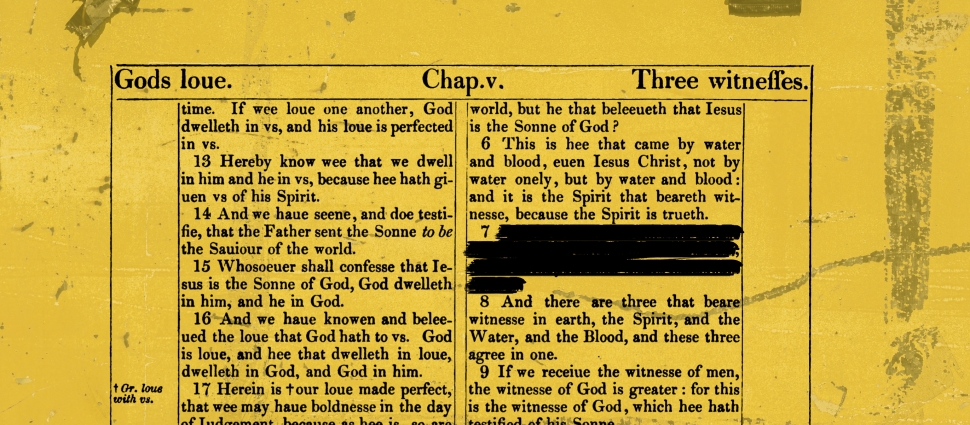Dort, Westminster, and the Johannine Comma

“For there are three that bear record in heaven, the Father, the Word, and the Holy Ghost: and these three are one.” – 1 John 5:7
The above verse is found in nearly all Reformation-era Bibles, such as Wycliffe 1395, Tyndale 1525, Coverdale 1535, Great Bible 1539, Matthew’s 1549, Geneva 1560, Bishops’ 1568, Sagradas Escrituras 1569, Biblia Reina Valera Antigua 1602, Giovanni Diodati 1607, and the Authorized (or King James) Version 1611. The verse is also cited as a proof text in many historic expressions of the Reformed faith: The Belgic Confession 1561 (Article 9), Heidelberg Catechism 1563 (Lord’s Day 8), Westminster Confession of Faith 1646 (Chapter 2), Westminster Larger Catechism 1648 (Q&A 9), and London Baptist Confession of Faith 1689 (Chapter 2).
Today, however, most Reformed scholars and pastors question or reject the verse as uninspired and unworthy of inclusion as a confessional or catechetical proof text for the doctrine of the Holy Trinity. This significant shift has led to confusion for contemporary Christians.
Debates over the inspiration of 1 John 5:7, otherwise known as the so-called Comma Johanneum, can be traced all the way back to the third century A.D. Nevertheless, it is important to recognize that Reformation-era scholars included the Comma in their doctrinal statements intentionally and with sound and studied reasons. Let us consider two historical and confessional witnesses to its veracity.
Witness # 1 - The Synod of Dort was the international church council that published the aforementioned Belgic Confession and Heidelberg Catechism. It also commissioned a new translation of the Dutch Bible which came to be called the Statenvertaling (States Translation). This new Bible contained many marginal notes and some of them acknowledged known textual variants. The entry for 1 John 5:7 reads as follows:
This verse, seeing it contains a very clear testimony of the Holy Trinity, seems to have been left out of some copies by the Arians, but is found in almost all Greek copies, and even by many ancient and worthy teachers also, who lived before the times of the Arians, brought out of them for proof of the Holy Trinity; and the opposition of the witnesses upon earth, verse 8, shows clearly that this verse must be there, as also appears by the 9th verse, where is spoken of this testimony of God.
This annotation makes several claims that hint at the evidence available to, and the text-critical methodology employed by, the Dutch Reformed scholars:
- The clarity and usefulness of a reading’s doctrinal testimony;
- Acknowledgement of textual corruption by third-century heretics;
- The witness of “almost all Greek copies” (i.e., manuscripts);
- The testimony of ancient and worthy teachers (i.e., commentaries);
- A reading’s apologetic usefulness in doctrinal controversies; and,
- Internal evidence (i.e., grammar, syntax, inference, etc.).
These considerations are regretfully different from much of the modern text-critical canons. However, it is important to remember that such a conclusion was not the private opinion of an uncredentialed individual, but the careful, corporate, accountable assessment of an international Reformed Synod influencing its formal testimony.
The Synod of Dort and its annotations on the Bible stand as a weighty historical witness to the Comma’s authenticity and usefulness as Scripture regarding a key doctrine about God Himself. We now call upon a second witness.
Witness # 2 - The Westminster Assembly obviously agreed with the Synod of Dort that the Comma was inspired because it is thrice cited as a proof text for the Holy Trinity, both within the second chapter of its Westminster Confession of Faith as well as its Larger and Shorter Catechisms (questions and answers 9 and 6 respectively). Further, in the language of its catechism answers, in fact, the exact wording “and these three are one” is directly quoting 1 John 5:7 verbatim.
Also worthy of consideration, this similar use of the Comma in both ecclesiastical assemblies was not done inadvertentlyor independent of one another; instead, there was a deliberate and historical connection between them.
The commissioners at the Westminster Assembly were well aware of the annotations published by the Synod of Dort. They even expressed an “incessant desire and longing” to have them translated into English. Once this work was completed, the annotations were then certified by the House of Lords.
Therefore, both the Synod of Dort and the Westminster Assembly serve as noteworthy authoritative and confessional witnesses in church history to the inspiration of the Comma as the Trinity’s divinely self-attesting testimony.
Our fathers in the faith were aware of the text-critical issues surrounding the Comma since the third century; they examined the extant evidence and found that “almost all Greek copies” available in their day contained it; they weighed other considerations inherent to their methodology; and they owned the reading as true and trustworthy.
Therefore, those who subscribe to the Reformed Confessions and Catechisms today and continue to confess with them that “there are three that bear record in heaven, the Father, the Word, and the Holy Ghost: and these three are one” can rest assured that they stand on firm ecclesiastical ground as they open the Holy Bible to 1 John 5:7 and bear witness to the doctrine of the the Holy Trinity with a hearty, “Thus saith the Lord!”
Christian McShaffrey is Pastor of Five Solas Church (OPC) in Reedsburg, Wisconsin, and stated clerk of the OPC’s Wisconsin and Minnesota Presbytery. Besides his ecclesiastical duties, he also serves as Vice Chairman to the Bahnsen Institute and is the administrator of the TR-friendly Church Directory. He and his wife Kelly have six children and live in the rolling hills just outside of Reedsburg.
Related Links
"The Bible Is Reliable" by William Boekestein
"Misquoting Jesus: The Story Behind Who Changed the Bible and Why," reviewed by Michael Kruger
"What Makes the King James Version Great?" by Leland Ryken
God Has Spoken by J. I. Packer
Why These Books and No Others? by Michael Kruger





